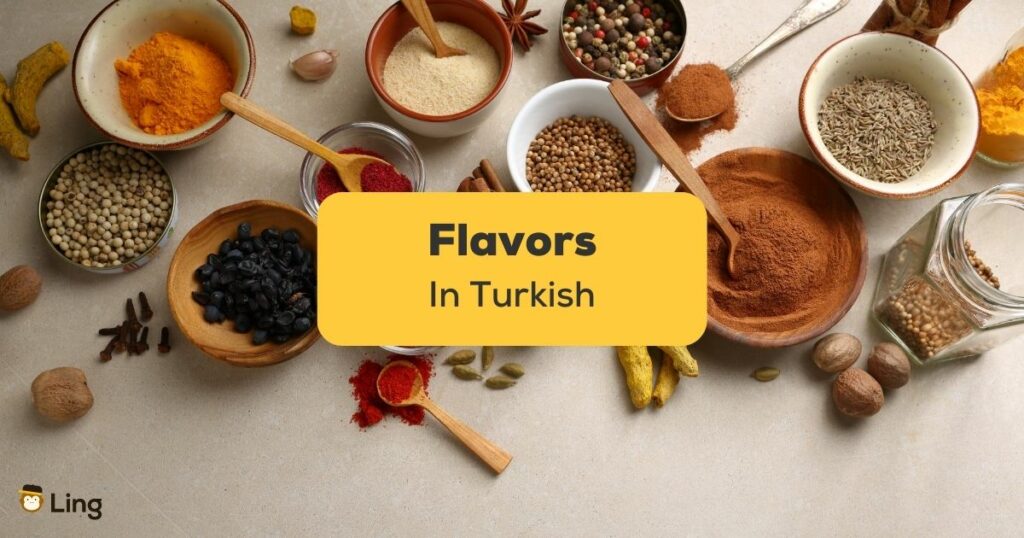No doubt, the whole world agrees that Turkish cuisine is one of the best in the world. And some flavors are really dominant in Turkish dishes and desserts. For example, Turkish coffee has a bitter flavor, whereas baklava has a super sweet and heavy syruped flavor. In this blog post, you’ll learn how to describe those flavors in Turkish!
Page Contents 📑
- A Quick Look Into Turkish Cuisine
- Commonly Used Flavors In Turkish Dishes
- Famous Spices Used In Turkish Dishes
- Flavors Vocabulary In Turkish
- Learn Turkish With Ling!
A Quick Look Into Turkish Cuisine
Turkish cuisine is a delightful blend of Mediterranean, Middle Eastern, and Central Asian influences, resulting in a rich and diverse culinary tradition. With its emphasis on fresh ingredients, bold flavors, and hearty meals, it is no wonder that Turkish cuisine is well-loved by people from all over the world.
Many restaurants in Turkey offer a wide range of traditional Turkish dishes, from iconic kebabs like döner and shish kebab to classic flatbreads like pide. For those with a sweet tooth, they offer a wide selection of sweet desserts such as baklava, Turkish delight, künefe, and more.
In summary, Turkish cuisine is a true reflection of the country’s history, culture, and geography. And the best part is there is something that speaks to everyone’s taste, from delicious meat dishes to unique veggie-based dishes. So, if you ever find yourself in Turkey, don’t leave the country without trying its delicious flavors!
Want to learn more about Turkish foods? Then you should see my blog article about mouth-watering Turkish foods!
Common Ingredients That Add Flavor To Turkish Dishes
Turkish cuisine is a fascinating mix of culinary traditions that have evolved over centuries. Most of the flavors and ingredients used in Turkish dishes today have their roots in the Ottoman period, which left an undeniable influence on Turkish cuisine. Let’s take a closer look at the five most commonly used flavors in Turkish cuisine:
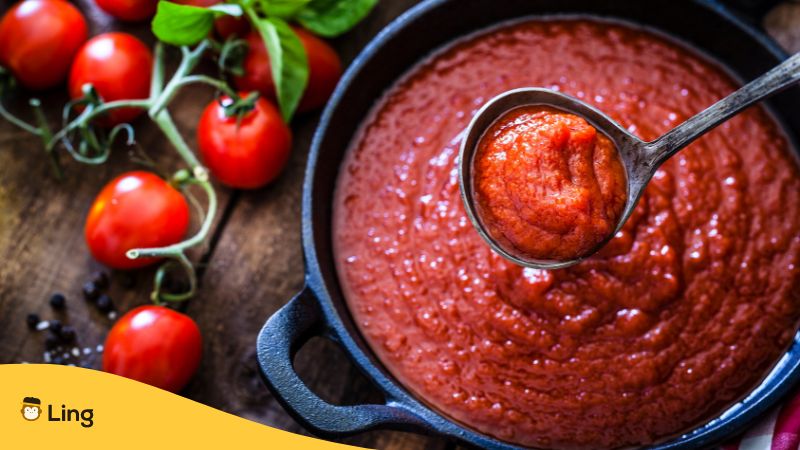
1. Tomato Sauce – Salça
Tomato sauce, known as “salça” in Turkish, is a base ingredient in Turkish cuisine, and it’s used in almost all dishes to add a rich flavor. It’s often used as a base for stews and casseroles, such as the popular dish imam bayildi, which is made from stuffed eggplants in a tomato-based sauce. Salça is also a key ingredient in some classic Turkish dishes like mantı, also known as the Turkish ravioli, which are small dumplings filled with spiced ground meat and served together with tomato-yogurt sauce.
The use of tomato sauce is so widespread in Turkish cuisine because it adds a depth of flavor that is essential to many homemade dishes. It also matches well with the fresh herbs and spices that are commonly used in Turkish dishes.
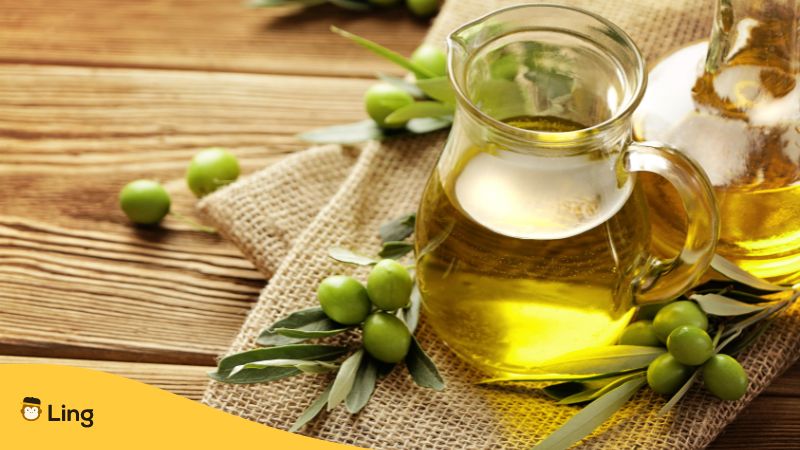
2. Olive Oil – Zeytinyağı
Olive oil is another staple ingredient in Turkish cuisine, and it’s widely used in many dishes for its light and fruity flavor. One of the most iconic uses of olive oil in Turkish cuisine is in the preparation of meze, a selection of small dishes served as appetizers. Olive oil is also a must-have for marinated vegetable dishes and stuffed grape leaves.
The use of olive oil is so widespread in Turkish cuisine because it not only adds flavor, it’s also a healthy fat and a key component of the Mediterranean diet, which is known for its health benefits.
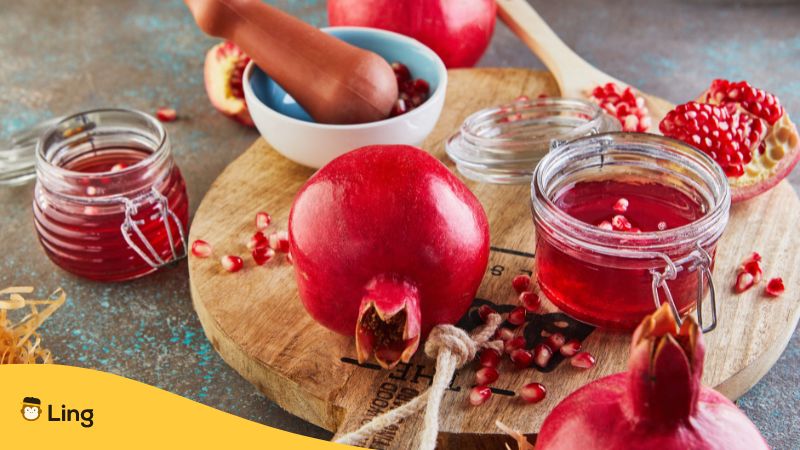
3. Pomegranate Syrup – Nar Ekşisi
Pomegranate syrup, also known as “nar ekşisi,” is a tangy and sweet ingredient that is used widely in Turkish cuisine. It’s made by diluting pomegranate juice until it turns into a thick syrup.
Pomegranate syrup is used in many dishes in Turkish cuisine, including salads, marinades, and dips. For example, it’s often added to the classic Turkish dip, muhammara, which is made with roasted red peppers, walnuts, and breadcrumbs. Pomegranate syrup is also used as a key ingredient in many dishes, such as çiğköfte (which literally means raw meatballs), to add a sweet-sour flavor.
The use of pomegranate syrup is so popular in Turkish cuisine because it adds a unique taste to dishes and complements the bold spices and herbs.
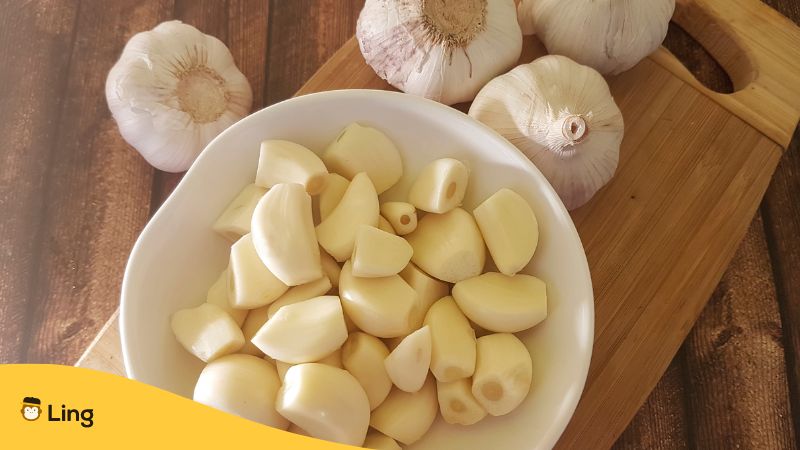
4. Garlic – Sarımsak
Garlic is widely used in Turkish dishes for its pungent and aromatic flavor. It’s a must-have in meat dishes like kebabs and stews.
The use of garlic in Turkish cuisine makes dishes more flavorful. However, it is not only used for its flavor but also for its health benefits. As it is known for its antibacterial properties, it’s often used in traditional homemade remedies to soothe cold and flu symptoms.
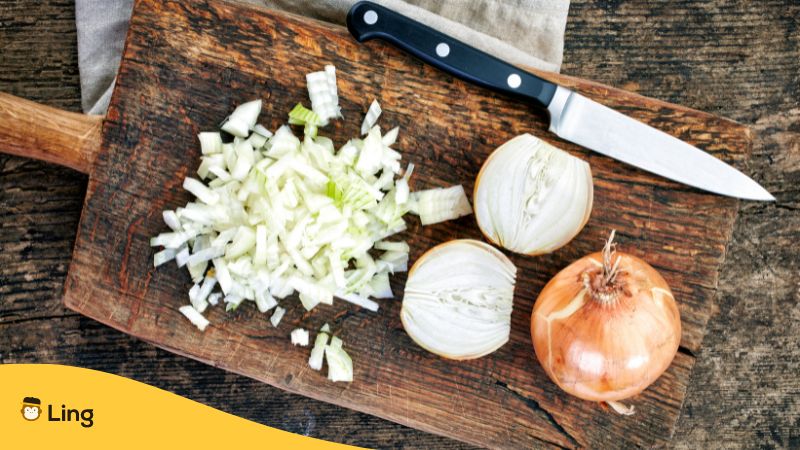
5. Onion – Soğan
Onion is a versatile and widely used ingredient in Turkish cuisine. It’s used as a base for stews and soups, as well as in meat dishes and salads.
One of the most popular uses of onion in Turkish cuisine is in the preparation of doner varieties, which is a type of Turkish street food made with seasoned and slow-roasted meat. It is often added to the meat mixture to make it more flavorful and moisturized.
With such a diverse array of ingredients, it’s no wonder that Turkish cuisine is so flavorful and loved by foodies around the world.
Famous Spices Used In Turkish Dishes
Turkish foods are known for their spiced aromas and seasonings. If you need to exclude a specific kind of spice that you may be allergic to, or you just don’t like, you should notify the waiters when you order food at a Turkish restaurant. Here’s a helpful list of common spices in Turkish to help you with that:
Flavors Vocabulary In Turkish
Knowing about flavors in Turkish can help a lot, whether you order a flavored coffee at a local cafe or some Turkish ice cream from the stubborn ice cream vendor on the street. So here is the list of basic flavors in Turkish:
Want to learn Turkish but don’t want to study more? We got you! Try Ling so you can learn Turkish at home by sparing as little as 15 mins per day!
Learn Turkish With Ling!

Ling offers more than 60 languages to learn! The Ling app provides interactive lessons, mini-games, and real-life conversations with chatbots, which are some of its finest features. Ling aids in the development of your language skills while prioritizing effective communication with native speakers. Whether you are a complete novice or have some knowledge of Turkish, Ling provides all the necessary tools to take your language skills to the next level.
Connect through language by downloading Ling from the Play Store or Apple Store today!
Also, don’t forget to check out Ling’s Turkish blog every week to keep up to date with new blog articles about the Turkish language and culture!
